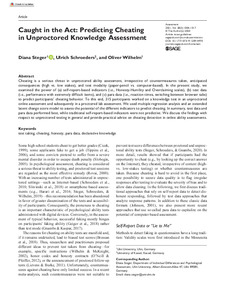Datum
2020-05-20Schlagwort
150 Psychologie Täuschung <Psychologie>VerhaltenstestExperimentelle PsychologieTestEhrlichkeitMetadata
Zur Langanzeige
Aufsatz

Caught in the Act: Predicting Cheating in Unproctored Knowledge Assessment
Zusammenfassung
Cheating is a serious threat in unproctored ability assessment, irrespective of countermeasures taken, anticipated consequences (high vs. low stakes), and test modality (paper-pencil vs. computer-based). In the present study, we examined the power of (a) self-report-based indicators (i.e., Honesty-Humility and Overclaiming scales), (b) test data (i.e., performance with extremely difficult items), and (c) para data (i.e., reaction times, switching between browser tabs) to predict participants’ cheating behavior. To this end, 315 participants worked on a knowledge test in an unproctored online assessment and subsequently in a proctored lab assessment. We used multiple regression analysis and an extended latent change score model to assess the potential of the different indicators to predict cheating. In summary, test data and para data performed best, while traditional self-report-based indicators were not predictive. We discuss the findings with respect to unproctored testing in general and provide practical advice on cheating detection in online ability assessments.
Zitierform
In: Assessment Volume 28 / Issue 3 (2020-05-20) , S. 1004-1017 ; EISSN 1552-3489Zusätzliche Informationen
NationallizenzFörderhinweis
This work was generously supported by the Bamberg Graduate School of Social Sciences, which is funded by the German Research Foundation (DFG) under the German Excellence Initiative (GSC1024). Dieser Beitrag ist mit Zustimmung des Rechteinhabers aufgrund einer (DFG-geförderten) Allianz- bzw. Nationallizenz frei zugänglich.Zitieren
@article{doi:10.17170/kobra-202103153520,
author={Steger, Diana and Schroeders, Ulrich and Wilhelm, Oliver},
title={Caught in the Act: Predicting Cheating in Unproctored Knowledge Assessment},
journal={Assessment},
year={2020}
}
0500 Oax
0501 Text $btxt$2rdacontent
0502 Computermedien $bc$2rdacarrier
1100 2020$n2020
1500 1/eng
2050 ##0##http://hdl.handle.net/123456789/12640
3000 Steger, Diana
3010 Schroeders, Ulrich
3010 Wilhelm, Oliver
4000 Caught in the Act: Predicting Cheating in Unproctored Knowledge Assessment / Steger, Diana
4030
4060 Online-Ressource
4085 ##0##=u http://nbn-resolving.de/http://hdl.handle.net/123456789/12640=x R
4204 \$dAufsatz
4170
5550 {{Täuschung <Psychologie>}}
5550 {{Verhaltenstest}}
5550 {{Experimentelle Psychologie}}
5550 {{Test}}
5550 {{Ehrlichkeit}}
7136 ##0##http://hdl.handle.net/123456789/12640
<resource xsi:schemaLocation="http://datacite.org/schema/kernel-2.2 http://schema.datacite.org/meta/kernel-2.2/metadata.xsd"> 2021-03-15T14:44:57Z 2020-05-20 doi:10.17170/kobra-202103153520 http://hdl.handle.net/123456789/12640 Nationallizenz This work was generously supported by the Bamberg Graduate School of Social Sciences, which is funded by the German Research Foundation (DFG) under the German Excellence Initiative (GSC1024). Dieser Beitrag ist mit Zustimmung des Rechteinhabers aufgrund einer (DFG-geförderten) Allianz- bzw. Nationallizenz frei zugänglich. eng Urheberrechtlich geschützt https://rightsstatements.org/page/InC/1.0/ test taking cheating honesty para data declarative knowledge 150 Caught in the Act: Predicting Cheating in Unproctored Knowledge Assessment Aufsatz Cheating is a serious threat in unproctored ability assessment, irrespective of countermeasures taken, anticipated consequences (high vs. low stakes), and test modality (paper-pencil vs. computer-based). In the present study, we examined the power of (a) self-report-based indicators (i.e., Honesty-Humility and Overclaiming scales), (b) test data (i.e., performance with extremely difficult items), and (c) para data (i.e., reaction times, switching between browser tabs) to predict participants’ cheating behavior. To this end, 315 participants worked on a knowledge test in an unproctored online assessment and subsequently in a proctored lab assessment. We used multiple regression analysis and an extended latent change score model to assess the potential of the different indicators to predict cheating. In summary, test data and para data performed best, while traditional self-report-based indicators were not predictive. We discuss the findings with respect to unproctored testing in general and provide practical advice on cheating detection in online ability assessments. open access Steger, Diana Schroeders, Ulrich Wilhelm, Oliver doi:10.1177/1073191120914970 Täuschung <Psychologie> Verhaltenstest Experimentelle Psychologie Test Ehrlichkeit publishedVersion EISSN 1552-3489 Issue 3 Assessment 1004-1017 Volume 28 2021-05-01 2021-05-01 false </resource>
Die folgenden Lizenzbestimmungen sind mit dieser Ressource verbunden:
Urheberrechtlich geschützt

